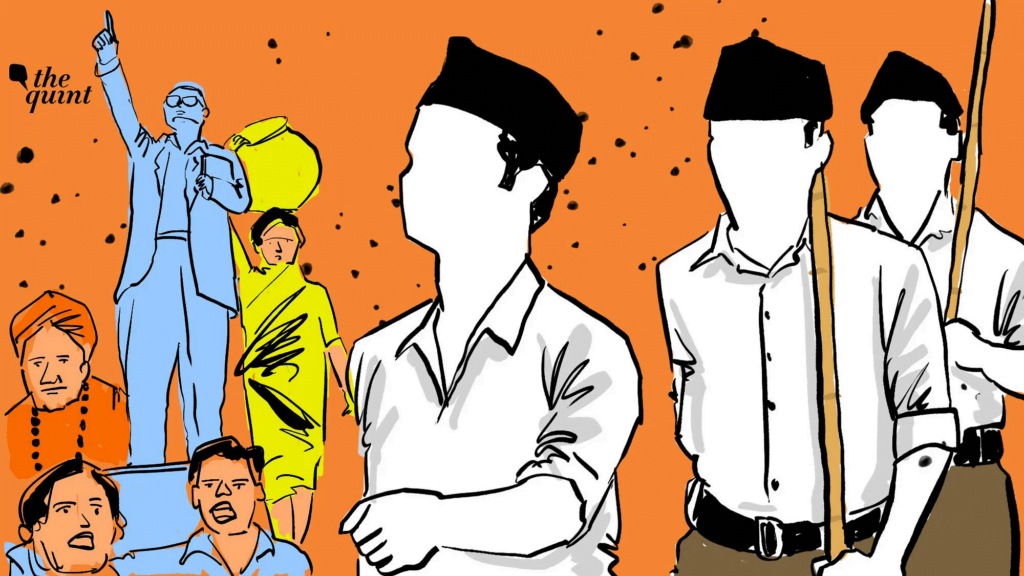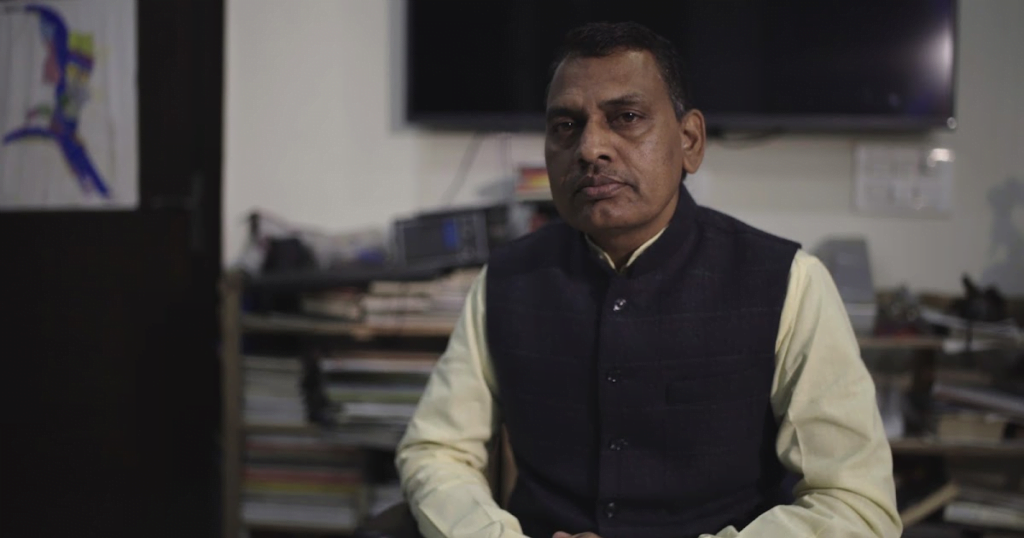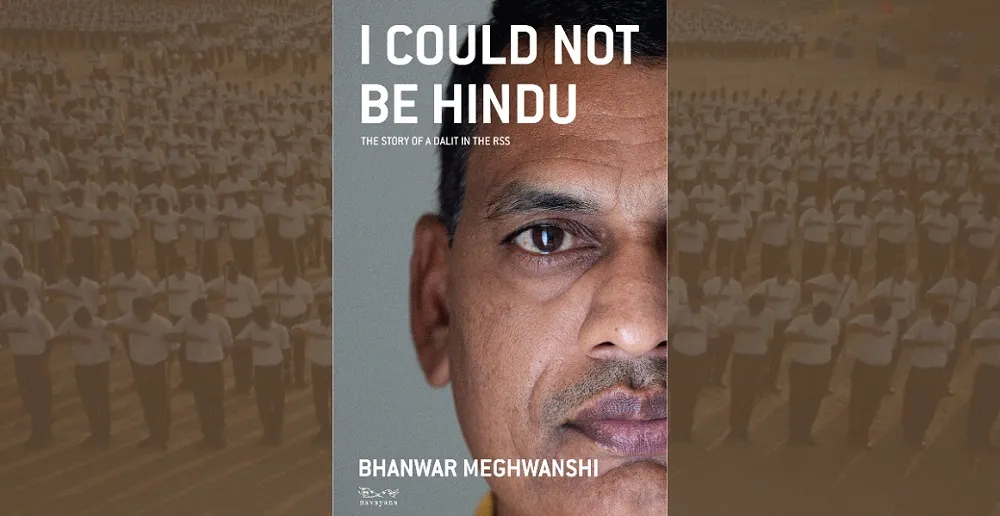Translated from Hindi by Nivedita Menon, I Could Not Be Hindu: The Story Of A Dalit In The RSS is authored by Bhanwar Meghwanshi.
Bhanwar Meghwanshi was born in 1975 into a Kabirpanthi weaver family in Rajasthan. He joined the Rashtriya Swayamsevak Sangh during his schooldays and became an ardent follower. Dominant caste Hindus refused to eat food cooked at their home, as commensality is not allowed in Hindu traditions.
He felt deeply humiliated and left the organisation. By that time he had risen to the ranks of block-level cadre and also started knowing district-level organisational structure, ideology, and practices. After leaving the RSS, he taught in a government school for two years.
There also, he faced the same issue – untouchability. This time the perpetrators were dominant OBCs. This pushed Meghwanshi to study the Hindu social order deeply. By then, he was familiar that the writings of B.R. Ambedkar are considered one of the finest scholars on Hindu society and the origins of untouchability in ancient India. Meghwanshi left Brahmanism and joined Ambedkarism.
I Could Not Be Hindu: The Story Of A Dalit In The RSS is the story of this journey: a journey from opposing religious minorities to supporting the secular ideals of equality.

This autobiography tells us about his family’s political, intellectual, and spiritual inclinations. It delves into how his father always opposed Meghwanshi’s decision to associate with dominant caste Hindu men, his passive acceptance of everyday forms of untouchability both within and outside shakhas, his acceptance that Dalits and Adivasis are also Hindus, that Hindus will be reduced to a minority in coming decades, that Muslims and Christians are not Indians and that progressive Hindus are the biggest enemies of traditionalist Hindus.
In due course, he became conscious that by inflating the numbers of Hindus, power elites try to divert resources from marginalised people to rich Hindus. He cautions his readers that the temple entry movement must not be understood as an attempt at Hinduisation but as an attempt to break the myth of harmony across castes
Meghwanshi experienced some disturbing events in his life but ignored them in pursuit of the larger cause of spreading Hinduism. What struck him was that despite being fully committed to this cause, he was not even considered an ordinary Hindu.
Untouchability is ‘just a small matter’ in the eyes of dominant caste shakha members. It was the silence of RSS ideologues that hit him hardest and he realised that Dalits and Adivasis are not Hindus. Their culture, history, lifeworld, and philosophy are far superior to Hinduism. He left Hinduism for Ambedkarism; his true calling.
Also read: Book Review: Dewaji—Making Of An Ambedkarite Family By Dipankar Kamble

I Could Not Be Hindu: The Story Of A Dalit In The RSS tells us in detail about Ambedkarism as lived by Bhanwar Meghwanshi. He started associating with Muslims and Christians and reading B.R. Ambedkar, Periyar, and Jyotiba Phule. Kabir, Ravidas, and Buddha became his sources of spiritual solace.
On the plane of his spiritual journey, he met a Sufi saint and got so inspired by his simplicity that he started a journal following the mystic’s kind suggestion. Simplicity, honesty, truthfulness, and empathy became the key values guiding Meghwanshi’s life.
As opposition arose, he found himself associating with civil society organisations like Mazdoor Kisan Shakti Sangathan and People’s Union for Civil Liberties. He regularly met lawyers, journalists, social activists, and intellectuals who left a deep impact on his intellectual and political journey.
Senior members of the Dalit and Adivasi movements interacted and helped Meghwanshi whenever he found himself in troubled waters. His voracious reading habit helped him tremendously. He studied how and why B.R. Ambedkar differed from M.K . Gandhi on various issues. With time, he realised that Buddhists and Sikhs are also not Hindus.

Ambedkarism opened his eyes to the fact that remaining neutral in times of trouble increases the problem. We find him as a person who supports the cause of religious and social minorities. The chapter ‘Meeting with a Sufi Dervish’ is one of the best chapters in I Could Not Be Hindu: The Story Of A Dalit In The RSS
Being associated with Ambedkarite and progressive organisations and thinkers, Bhanwar Meghwanshi got to know about the status of women and the marginalised. RTI and NREGA became important demands to alleviate poverty and fight corruption from the local to national level.
In the case of women, he strongly felt the need to promote their education, health, employment opportunities, and freedom from misogynistic social norms.
In due course, he became conscious that by inflating the numbers of Hindus, power elites try to divert resources from marginalised people to rich Hindus. He cautions his readers that the temple entry movement must not be understood as an attempt at Hinduisation but as an attempt to break the myth of harmony across castes.
Also read: Ambedkar’s Vision Of Companionship: Breaking Traditional Norms Around Marriage
Ambedkarism opened his eyes to the fact that remaining neutral in times of trouble increases the problem. We find him as a person who supports the cause of religious and social minorities. The chapter ‘Meeting with a Sufi Dervish’ is one of the best chapters in I Could Not Be Hindu: The Story Of A Dalit In The RSS.
It is here that we see how deeply Meghwanshi got charmed by a Sufi dervish and started journalism in favour of social justice. The more he interacted with people at the periphery, the more he experienced humanity.

One wonders what are Meghwanshi’s thoughts on reservation in the private sector, denial of SC status to Dalit Muslims and Dalit Christians, reservation for women in the parliament and state assemblies, electoral reforms, and the importance of numbers in census surveys.
B.R. Ambedkar’s s seminal text States and Minorities (1947) has some important suggestions in that regard. As of now, I can easily say that I Could Not Be Hindu: The Story Of A Dalit In The RSS will send ripples across the world with its daring headlines and unparalleled experiences.
Narrating events with such unflinching courage is what grabs the attention of the readers. This makes I Could not be Hindu a truly important, unputdownable read.




